人教新版英语七年级下册Unit11SectionA1a-1c课件 (共29张PPT)
文档属性
| 名称 | 人教新版英语七年级下册Unit11SectionA1a-1c课件 (共29张PPT) | 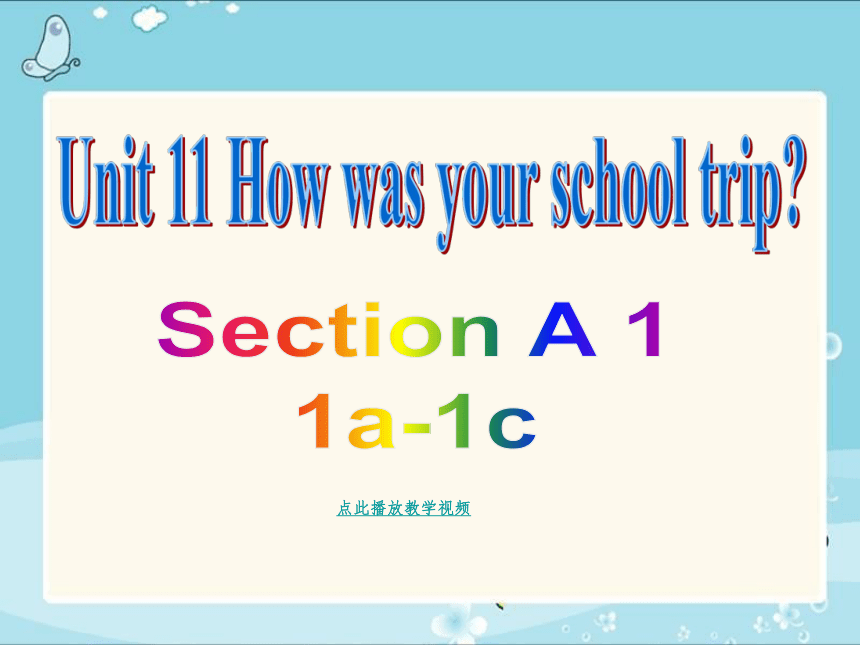 | |
| 格式 | zip | ||
| 文件大小 | 1.3MB | ||
| 资源类型 | 教案 | ||
| 版本资源 | 人教新目标(Go for it)版 | ||
| 科目 | 英语 | ||
| 更新时间 | 2016-05-10 21:34:13 | ||
图片预览

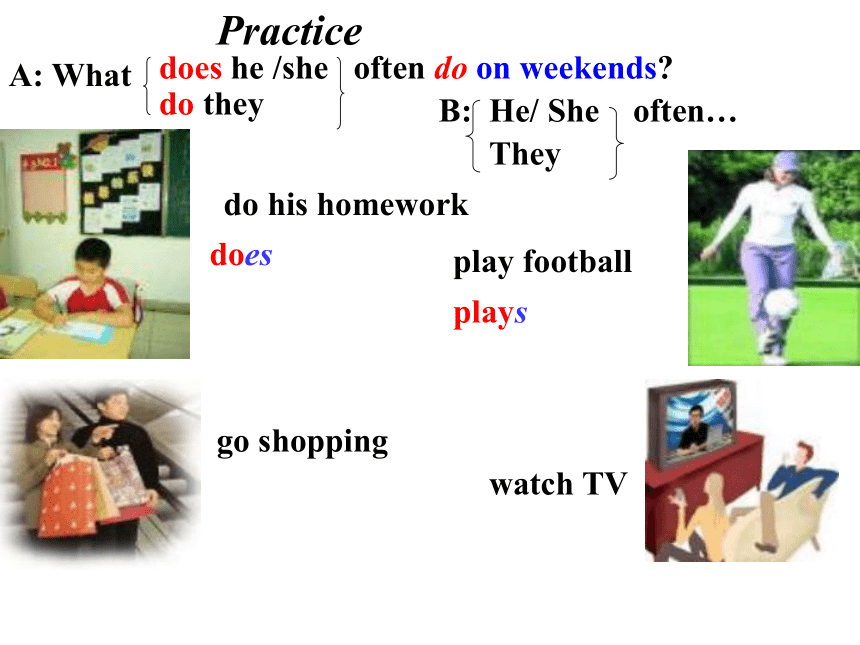
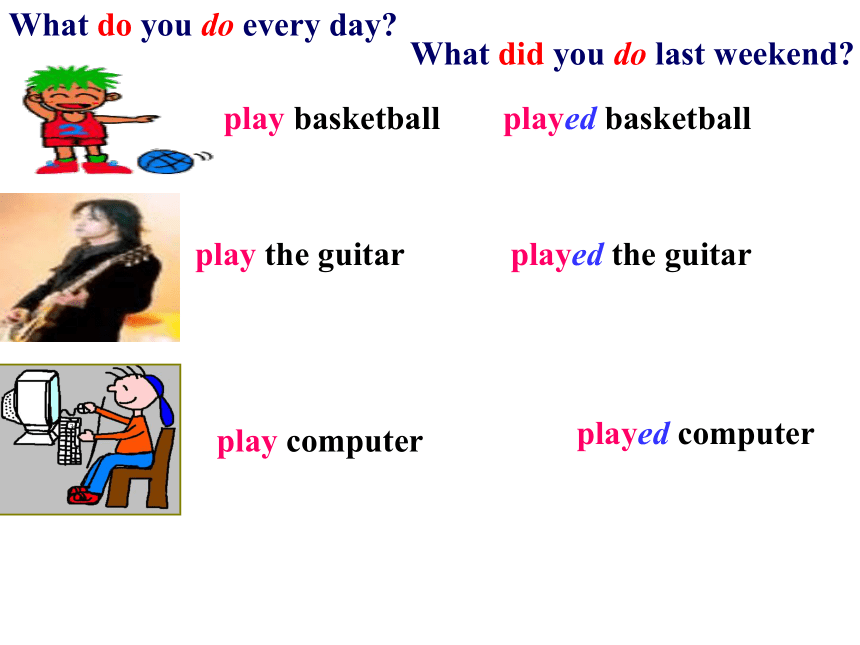
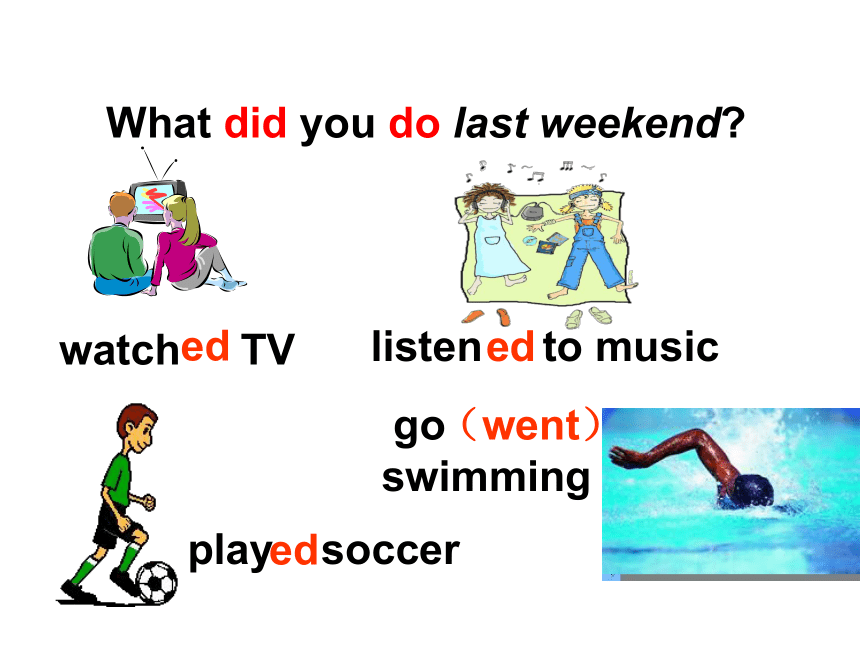
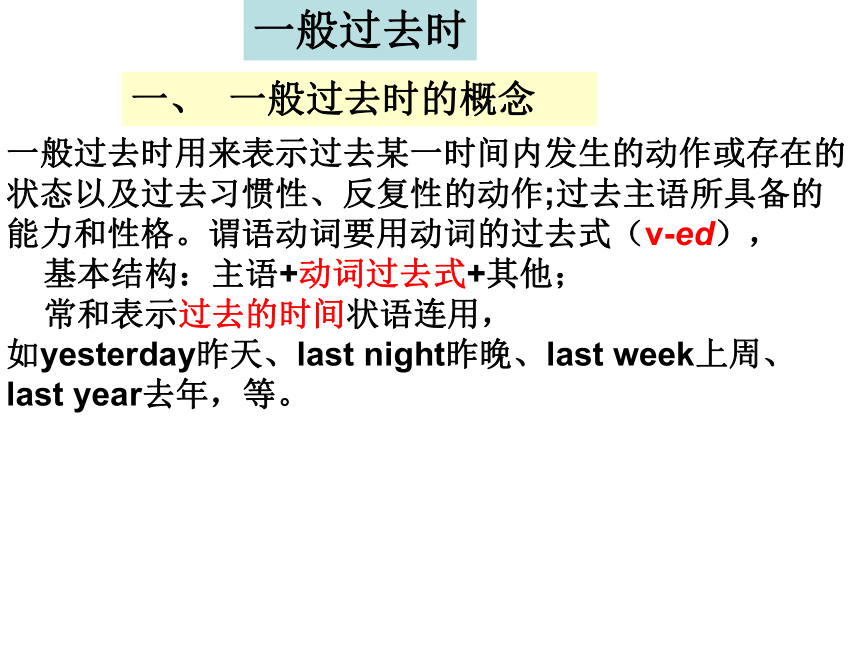
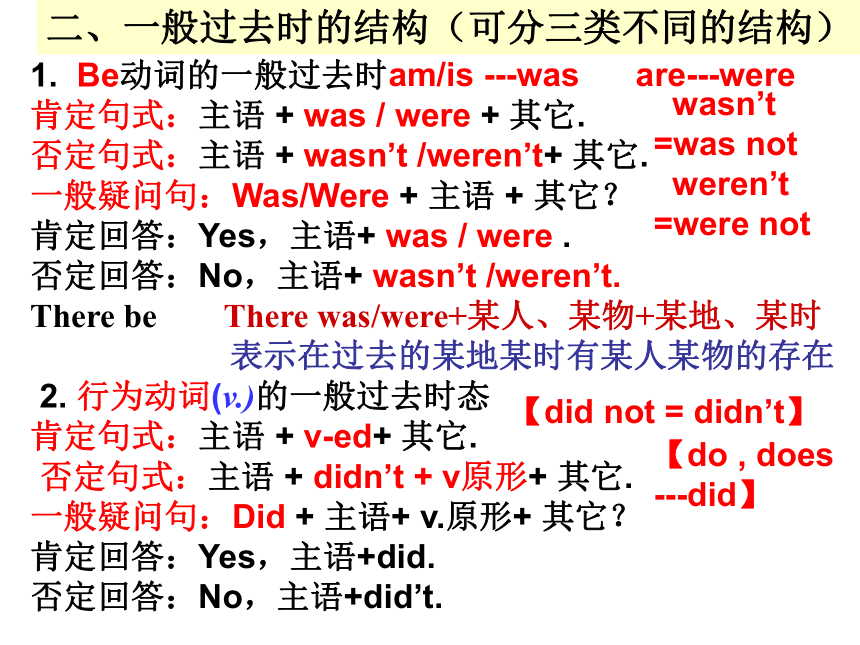
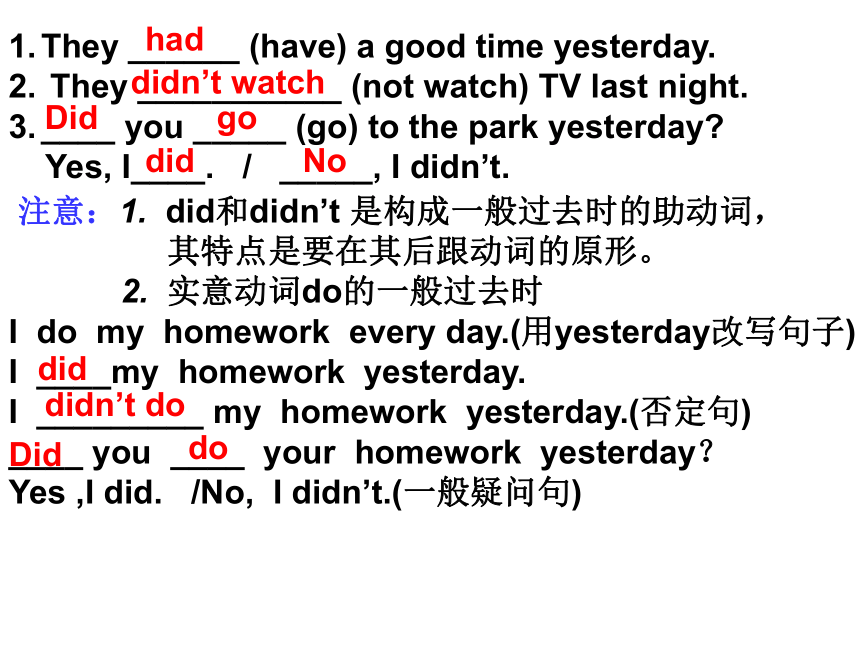
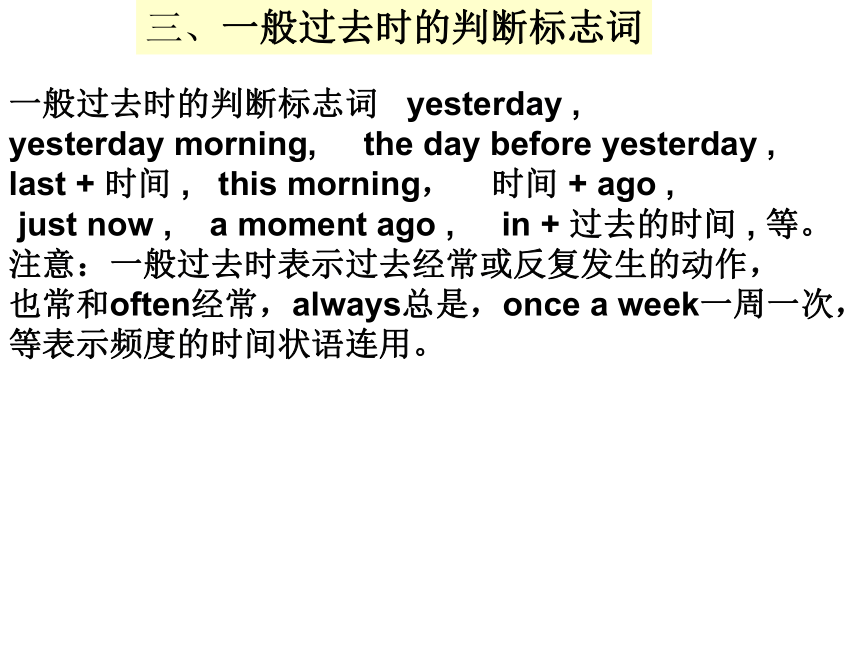
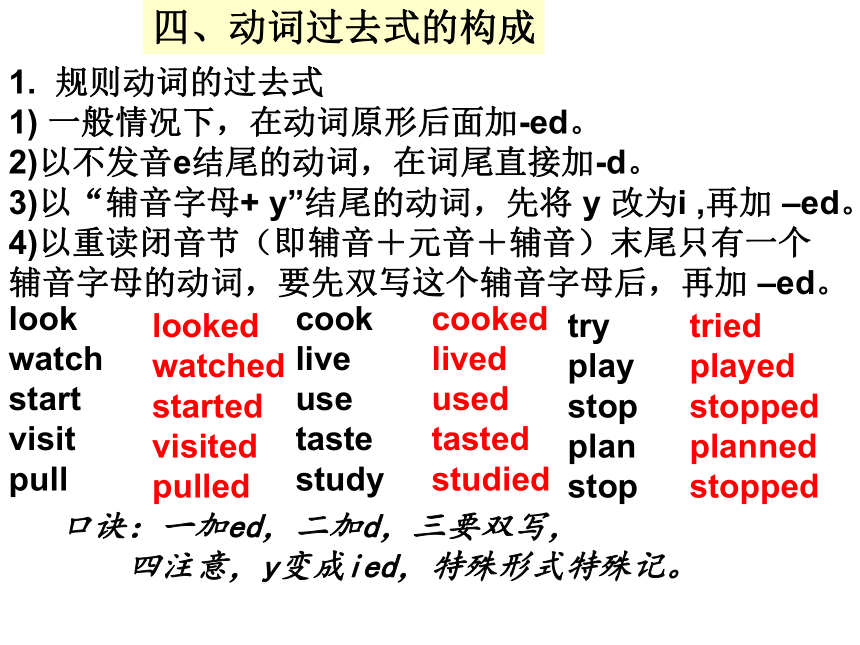
文档简介
课件29张PPT。Section A 1
1a-1cUnit 11 How was your school trip?点此播放教学视频B: He/ She often…play footballdoes he /she often do on weekends?Practicedo his homeworkdo theygo shoppingwatch TVTheyA: Whatdoesplaysplay the guitarplayed the guitarplay computerplayed computerWhat do you do every day?What did you do last weekend?play basketballplayed basketballWhat did you do last weekend?watch TVlisten to musicplay soccer go
swimmingeded(went)ed一般过去时用来表示过去某一时间内发生的动作或存在的状态以及过去习惯性、反复性的动作;过去主语所具备的能力和性格。谓语动词要用动词的过去式(v-ed),
基本结构:主语+动词过去式+其他;
常和表示过去的时间状语连用,
如yesterday昨天、last night昨晚、last week上周、
last year去年,等。一般过去时一、 一般过去时的概念 ????1. Be动词的一般过去时?
肯定句式:主语 + was / were + 其它.?
否定句式:主语 + wasn’t /weren’t+ 其它.?
一般疑问句:Was/Were + 主语 + 其它?
肯定回答:Yes,主语+ was / were .
否定回答:No,主语+ wasn’t /weren’t. There be There was/were+某人、某物+某地、某时
表示在过去的某地某时有某人某物的存在
?2. 行为动词(v.)的一般过去时态 ?
肯定句式:主语 + v-ed+ 其它.
?否定句式:主语 + didn’t + v原形+ 其它.
一般疑问句:Did + 主语+ v.原形+ 其它?
肯定回答:Yes,主语+did.
否定回答:No,主语+did’t. wasn’t
=was not
weren’t
=were not【did not = didn’t】?【do , does
---did】am/is ---was are---were?二、一般过去时的结构(可分三类不同的结构)?注意:1.? did和didn’t 是构成一般过去时的助动词,
其特点是要在其后跟动词的原形。
?? ?? 2.? 实意动词do的一般过去时?
I? do ?my? homework? every day.(用yesterday改写句子)
I? ____my? homework? yesterday.
I? _________?my? homework? yesterday.(否定句)
____?you ?____ ?your? homework? yesterday?
Yes ,I did.?? /No, ?I didn’t.(一般疑问句)They ______ (have) a good time yesterday.
They ___________ (not watch) TV last night.
____ you _____ (go) to the park yesterday?
Yes, I____. / _____, I didn’t.haddidn’t watchDidgodidNodid ?didn’t doDiddo一般过去时的判断标志词 yesterday ,
yesterday morning, the day before yesterday ,
last + 时间 , this morning, 时间 + ago ,
just now , a moment ago , in + 过去的时间 , 等。
注意:一般过去时表示过去经常或反复发生的动作,
也常和often经常,always总是,once a week一周一次,
等表示频度的时间状语连用。三、一般过去时的判断标志词1. 规则动词的过去式
1) 一般情况下,在动词原形后面加-ed。
2)以不发音e结尾的动词,在词尾直接加-d。?
3)以“辅音字母+ y”结尾的动词,先将 y 改为i ,再加 –ed。
4)以重读闭音节(即辅音+元音+辅音)末尾只有一个
辅音字母的动词,要先双写这个辅音字母后,再加 –ed。口诀:一加ed,二加d,三要双写,
四注意,y变成ied,特殊形式特殊记。四、动词过去式的构成look?
watch???
start???
visit?
pull?looked??
watched????
started???
visited?
pulledcook
live???
use??
taste
studycooked
lived???
used??
tasted
studiedtry??????
play
stop?
plan?
stoptried??????
played
stopped?
planned?
stopped① 表示过去某个时间发生的动作或存在的状态。
? My father _______in Shanghai last year.
我爸爸去年在上海工作。
②表示过去的习惯性或经常发生的动作,常和often经常,
always总是,once a week一周一次,等表示频度的时间
状语连用。
I often _____________on foot.(过去)我经常步行去上学。
③与when等连词引导的?状语从句连用。
When she got home,she _____a short rest.
当她到家时,她稍微休息了一下。五、 一般过去时的基本用法workedwent to schoolhadLook at the picture.
This is a farm. Last week Carol and his classmates had a school trip. They went to the farm.
What did they do on the farm?
Let’s go and have a look.点此播放朗读视频--What did he do on the farm?
He rode a horse.
--Did he ride a horse?
Yes, he did.--Did he milk a cow?
--Yes, he did. He milked a cow.--Did he ride a horse?
No, he didn’t.
--Did he feed chickens?
Yes, he did. He fed chickens.--Did he go to the zoo?
No, he didn’t. He went to a farm.
--Did he see any cows?
Yes, he did. He saw quite a lot.B: I _____ to the movie.A: What ___ you do
yesterday?didwentA: What ___ you do last
weekend?B: I ___ my homework.diddidExercises1a Match the phrases with the pictures. went for a walk milked a cow
rode a horse fed chickens
talked with a farmer took some photosebacfd1b Listen and circle the three things
Carol did on her school trip in 1a.Listeningwent for a walk milked a cow
rode a horse fed chickens
talked with a farmer took some photosA: Did Carol take any photos?
B: Yes, she did.
A: Did Carol ride a horse?
B:
A: Did Carol talk with the farmer?
B: 1c Ask and answer questions
about Carol’s school trip.Speakingtook some photoswent for a walkmilked a cowrode a horsefed chickenstalked with a farmerquiet a lot 相当多+of+可数或不可数, 也可以单独使用。 quite a little 相当多+不可数名词 quite a few 相当多+可数名词1. Did you see any cows? Yes, I did. I saw quite a lot.Language pointse.g. 我看到了相当多的奶牛。
I saw quite a lot of cows.
夏天我经常打网球。
I play tennis quite a lot in the summer.
不少学生迟到了。
Quite a few students were late.take与photo, picture等词搭配时,表示“拍摄,摄影”。表示“拍摄某物或人”,就要在短语后面接介词“of”引入所拍摄的对象。
e.g. The girl likes to take photos of herself
with her cell phone. 2. Did Carol take any photos? 卡罗尔拍照片了吗?fun表示“有趣的事情”,为不可数名词。
e.g. Look, Peter. The children are having
so much fun. 3. It was so much fun. 4. Lucky you! 你真幸运!
这是一句非正式口语,相当于You’re so lucky.
Lucky之后的人称还可以改为me, him。I. 用适当的词填空
1. Today is Monday. Yesterday ___ Sunday
2. What ___ you do the day before yesterday?
3.____ you ride a horse last week? was did DidExercise 4. ____ he see any cows on the farm? Yes, he did.
5. Did he milk a cow on the farm? No, he ______.
6. Did you see any cows?
Yes, I did. I ___ quite a lot.
7. I ___ the chickens last week. Did didn’t saw fedII. 汉译英1. 他上周在农场骑马。
2. 他上个月爬山了。
3. 他一小时前喂了小鸡。Last week he rode a horse on the farm.
He climbed the mountain last month.
He fed chickens an hour ago.4. 你昨天去了动物园吗?没有,我去了农场。
5. 你在农场看到一些奶牛吗?看到了,看到了相当多地奶牛。Did you go to the zoo? No, I didn’t. I went to the farm.
Did you see any cows? Yes I did. I saw quite a lot.点此播放听力视频IV. 译出下列短语
去散步
去购物
去钓鱼
挤奶牛
骑马
骑自行车
喂小鸡
和某人谈话
拍照go for a walk
go shopping
go fishing
milk a cow
ride a horse
ride a bike
feed chickens
talk with …
take photosIII. 写出下列单词的过去式
talk milk
am /is are
go ride
feed take
do seetalked
was
went
fed
did milked
were
rode
took
saw 点此播放解题视频Thank you!点此播放上课视频Help the family with some things you can do
1a-1cUnit 11 How was your school trip?点此播放教学视频B: He/ She often…play footballdoes he /she often do on weekends?Practicedo his homeworkdo theygo shoppingwatch TVTheyA: Whatdoesplaysplay the guitarplayed the guitarplay computerplayed computerWhat do you do every day?What did you do last weekend?play basketballplayed basketballWhat did you do last weekend?watch TVlisten to musicplay soccer go
swimmingeded(went)ed一般过去时用来表示过去某一时间内发生的动作或存在的状态以及过去习惯性、反复性的动作;过去主语所具备的能力和性格。谓语动词要用动词的过去式(v-ed),
基本结构:主语+动词过去式+其他;
常和表示过去的时间状语连用,
如yesterday昨天、last night昨晚、last week上周、
last year去年,等。一般过去时一、 一般过去时的概念 ????1. Be动词的一般过去时?
肯定句式:主语 + was / were + 其它.?
否定句式:主语 + wasn’t /weren’t+ 其它.?
一般疑问句:Was/Were + 主语 + 其它?
肯定回答:Yes,主语+ was / were .
否定回答:No,主语+ wasn’t /weren’t. There be There was/were+某人、某物+某地、某时
表示在过去的某地某时有某人某物的存在
?2. 行为动词(v.)的一般过去时态 ?
肯定句式:主语 + v-ed+ 其它.
?否定句式:主语 + didn’t + v原形+ 其它.
一般疑问句:Did + 主语+ v.原形+ 其它?
肯定回答:Yes,主语+did.
否定回答:No,主语+did’t. wasn’t
=was not
weren’t
=were not【did not = didn’t】?【do , does
---did】am/is ---was are---were?二、一般过去时的结构(可分三类不同的结构)?注意:1.? did和didn’t 是构成一般过去时的助动词,
其特点是要在其后跟动词的原形。
?? ?? 2.? 实意动词do的一般过去时?
I? do ?my? homework? every day.(用yesterday改写句子)
I? ____my? homework? yesterday.
I? _________?my? homework? yesterday.(否定句)
____?you ?____ ?your? homework? yesterday?
Yes ,I did.?? /No, ?I didn’t.(一般疑问句)They ______ (have) a good time yesterday.
They ___________ (not watch) TV last night.
____ you _____ (go) to the park yesterday?
Yes, I____. / _____, I didn’t.haddidn’t watchDidgodidNodid ?didn’t doDiddo一般过去时的判断标志词 yesterday ,
yesterday morning, the day before yesterday ,
last + 时间 , this morning, 时间 + ago ,
just now , a moment ago , in + 过去的时间 , 等。
注意:一般过去时表示过去经常或反复发生的动作,
也常和often经常,always总是,once a week一周一次,
等表示频度的时间状语连用。三、一般过去时的判断标志词1. 规则动词的过去式
1) 一般情况下,在动词原形后面加-ed。
2)以不发音e结尾的动词,在词尾直接加-d。?
3)以“辅音字母+ y”结尾的动词,先将 y 改为i ,再加 –ed。
4)以重读闭音节(即辅音+元音+辅音)末尾只有一个
辅音字母的动词,要先双写这个辅音字母后,再加 –ed。口诀:一加ed,二加d,三要双写,
四注意,y变成ied,特殊形式特殊记。四、动词过去式的构成look?
watch???
start???
visit?
pull?looked??
watched????
started???
visited?
pulledcook
live???
use??
taste
studycooked
lived???
used??
tasted
studiedtry??????
play
stop?
plan?
stoptried??????
played
stopped?
planned?
stopped① 表示过去某个时间发生的动作或存在的状态。
? My father _______in Shanghai last year.
我爸爸去年在上海工作。
②表示过去的习惯性或经常发生的动作,常和often经常,
always总是,once a week一周一次,等表示频度的时间
状语连用。
I often _____________on foot.(过去)我经常步行去上学。
③与when等连词引导的?状语从句连用。
When she got home,she _____a short rest.
当她到家时,她稍微休息了一下。五、 一般过去时的基本用法workedwent to schoolhadLook at the picture.
This is a farm. Last week Carol and his classmates had a school trip. They went to the farm.
What did they do on the farm?
Let’s go and have a look.点此播放朗读视频--What did he do on the farm?
He rode a horse.
--Did he ride a horse?
Yes, he did.--Did he milk a cow?
--Yes, he did. He milked a cow.--Did he ride a horse?
No, he didn’t.
--Did he feed chickens?
Yes, he did. He fed chickens.--Did he go to the zoo?
No, he didn’t. He went to a farm.
--Did he see any cows?
Yes, he did. He saw quite a lot.B: I _____ to the movie.A: What ___ you do
yesterday?didwentA: What ___ you do last
weekend?B: I ___ my homework.diddidExercises1a Match the phrases with the pictures. went for a walk milked a cow
rode a horse fed chickens
talked with a farmer took some photosebacfd1b Listen and circle the three things
Carol did on her school trip in 1a.Listeningwent for a walk milked a cow
rode a horse fed chickens
talked with a farmer took some photosA: Did Carol take any photos?
B: Yes, she did.
A: Did Carol ride a horse?
B:
A: Did Carol talk with the farmer?
B: 1c Ask and answer questions
about Carol’s school trip.Speakingtook some photoswent for a walkmilked a cowrode a horsefed chickenstalked with a farmerquiet a lot 相当多+of+可数或不可数, 也可以单独使用。 quite a little 相当多+不可数名词 quite a few 相当多+可数名词1. Did you see any cows? Yes, I did. I saw quite a lot.Language pointse.g. 我看到了相当多的奶牛。
I saw quite a lot of cows.
夏天我经常打网球。
I play tennis quite a lot in the summer.
不少学生迟到了。
Quite a few students were late.take与photo, picture等词搭配时,表示“拍摄,摄影”。表示“拍摄某物或人”,就要在短语后面接介词“of”引入所拍摄的对象。
e.g. The girl likes to take photos of herself
with her cell phone. 2. Did Carol take any photos? 卡罗尔拍照片了吗?fun表示“有趣的事情”,为不可数名词。
e.g. Look, Peter. The children are having
so much fun. 3. It was so much fun. 4. Lucky you! 你真幸运!
这是一句非正式口语,相当于You’re so lucky.
Lucky之后的人称还可以改为me, him。I. 用适当的词填空
1. Today is Monday. Yesterday ___ Sunday
2. What ___ you do the day before yesterday?
3.____ you ride a horse last week? was did DidExercise 4. ____ he see any cows on the farm? Yes, he did.
5. Did he milk a cow on the farm? No, he ______.
6. Did you see any cows?
Yes, I did. I ___ quite a lot.
7. I ___ the chickens last week. Did didn’t saw fedII. 汉译英1. 他上周在农场骑马。
2. 他上个月爬山了。
3. 他一小时前喂了小鸡。Last week he rode a horse on the farm.
He climbed the mountain last month.
He fed chickens an hour ago.4. 你昨天去了动物园吗?没有,我去了农场。
5. 你在农场看到一些奶牛吗?看到了,看到了相当多地奶牛。Did you go to the zoo? No, I didn’t. I went to the farm.
Did you see any cows? Yes I did. I saw quite a lot.点此播放听力视频IV. 译出下列短语
去散步
去购物
去钓鱼
挤奶牛
骑马
骑自行车
喂小鸡
和某人谈话
拍照go for a walk
go shopping
go fishing
milk a cow
ride a horse
ride a bike
feed chickens
talk with …
take photosIII. 写出下列单词的过去式
talk milk
am /is are
go ride
feed take
do seetalked
was
went
fed
did milked
were
rode
took
saw 点此播放解题视频Thank you!点此播放上课视频Help the family with some things you can do
同课章节目录
- Unit 1 Can you play the guitar?
- Section A
- Section B
- Unit 2 What time do you go to school?
- Section A
- Section B
- Unit 3 How do you get to school?
- Section A
- Section B
- Unit 4 Don't eat in class.
- Section A
- Section B
- Unit 5 Why do you like pandas?
- Section A
- Section B
- Unit 6 I'm watching TV.
- Section A
- Section B
- Review of Units 1-6
- Unit 7 It's raining!
- Section A
- Section B
- Unit 8 Is there a post office near here?
- Section A
- Section B
- Unit 9 What does he look like?
- Section A
- Section B
- Unit 10 I'd like some noodles.
- Section A
- Section B
- Unit 11 How was your school trip?
- Section A
- Section B
- Unit 12 What did you do last weekend?
- Section A
- Section B
